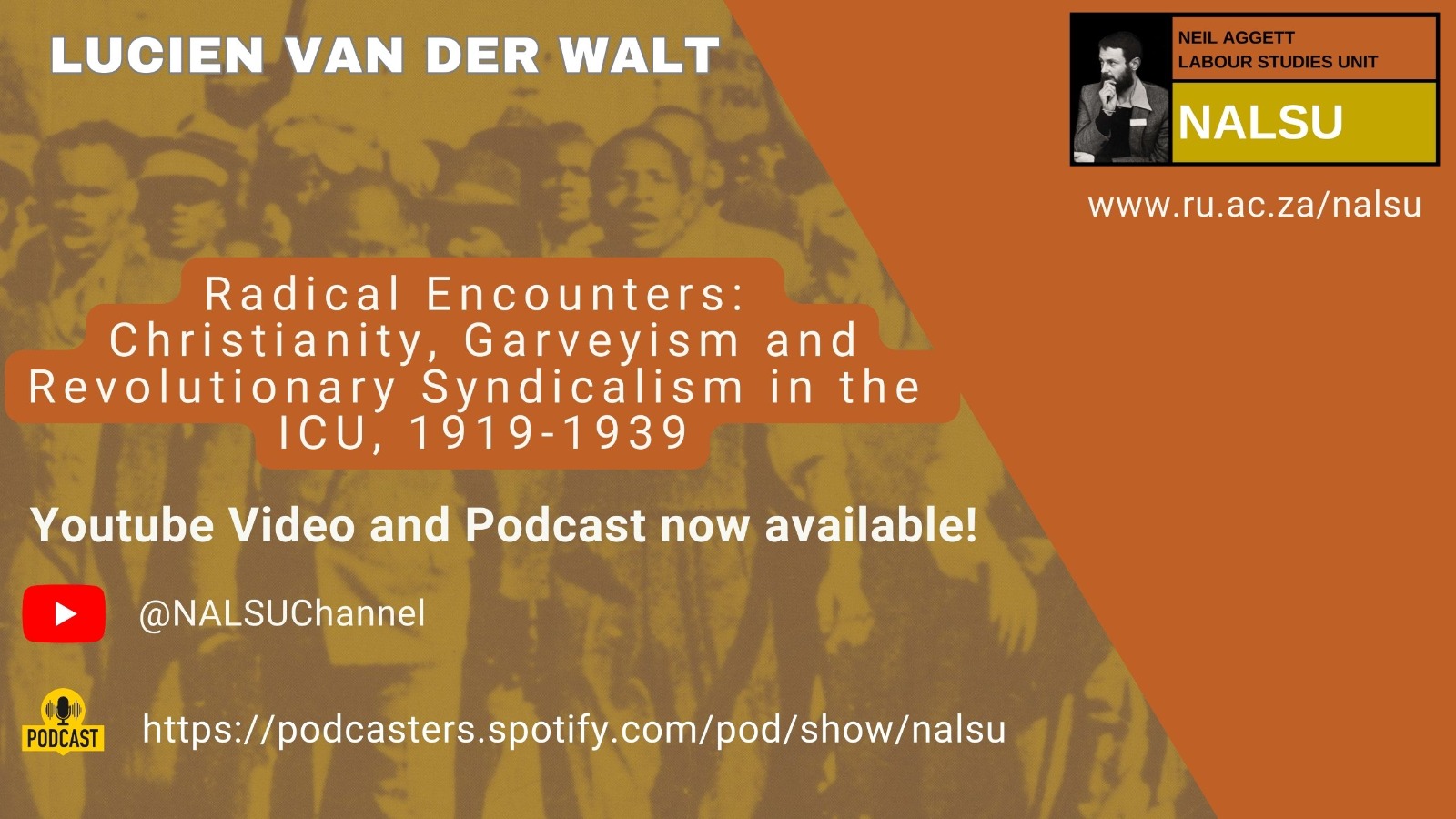
NALSU NEWS: Labour Studies podcast/ video: Lucien van der Walt, NALSU, Rhodes: “Radical Encounters: Christianity, Garveyism and Revolutionary Syndicalism in the Industrial & Commercial Workers Union of Africa, 1919-1939”
TOPIC: Founded 1919 in Cape Town, the Industrial and Commercial Workers Union (ICU) exploded across southern Africa. The first mass black/ Coloured movement -- with 200,000 members across Eswatini, Lesotho, Namibia, South Africa, Zambia and Zimbabwe -- it overshadowed bodies like the African National Congress (ANC), Communist Party of SA and the Southern Rhodesia Bantu Voters’ Association. The ICU dominated African politics for years, drew tens of thousands including women into politics, helped forge a popular counter-public, mobilised in communities and rural areas, and promised land and freedom through a general strike. This paper focuses on the ICU's complex, syncretic politics, especially Christian, Garveyite and revolutionary syndicalist influences. Syndicalism – developing from Bakunin's anarchism -- advocated a bottom-up, inclusive radical unionism, building consciousness and popular power until workers could occupy and self-manage workplaces, abolish the state and establish libertarian socialism. It was, the paper argues, an essential source of key ICU themes: class struggle, internationalism, One Big Union, autonomy from parties, and the emancipatory general strike. But syndicalism was only part of the ICU's contradictory, unstable politics which -- poorly translated into strategy, or workers' control -- contributed to its dramatic downfall, while the ICU lasted into the 1950s, its lessons and legacy remain.
DETAILS: This is a recording of a blended event in the Neil Aggett Labour Studies Unit (NALSU) Labour Studies Seminar Series, held on Thursday, 25 August 2022, 4pm, on Zoom and at Eden Grove Seminar Room 2, Rhodes University, Makhanda, South Africa.
Please find below the links to the Podcast, YouTube Video and paper Prof van der Walt presented.
PODCAST: https://podcasters.spotify.com/pod/show/nalsu
VIDEO: https://www.youtube.com/watch?v=S-JCaNKb8to&t=16s
PAPER: https://tinyurl.com/ya999hvn
SPEAKER: Professor Lucien van der Walt, sociologist and labour educator, Rhodes University, South Africa. His books include "Anarchism and Syndicalism in the Colonial and Postcolonial World, 1880-1940" (2010/2014, ed. with Steven Hirsch), "Negro e Vermelho: Anarquismo, Sindicalismo Revolucionário e Pessoas de Cor na África Meridional nas Décadas de 1880 a 1920" (2014), "Politics at a Distance from the State: Radical and African Perspectives" (2018/2022, ed. with Kirk Helliker) and "Labour Struggles in Southern Africa, 1919-1939: New Perspectives on the Industrial and Commercial Workers' Union (ICU)" (2023, ed. with David Johnson & Noor Nieftagodien). He is the current NALSU director.
ABOUT NALSU: Based in the Eastern Cape, South Africa, NALSU is engaged in policy, research and workers' education. Built around a vibrant team, including from the disciplines of Sociology and Economics, NALSU has a democratic, non‐sectarian, non-aligned and pluralist practice, and active relations with a range of advocacy, labour and research organisations. We draw strength from our location in a province where the legacy of apartheid and the cheap labour system, and post-apartheid contradictions, are keenly felt. NALSU is named in honour of Neil Hudson Aggett, union organiser and medical doctor who died in an apartheid jail in 1982 following brutality and torture.
